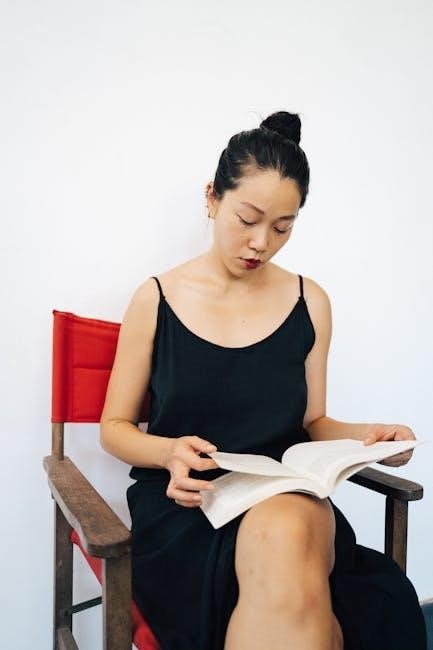Kevin Kwan’s debut novel, published in 2013, humorously explores Singapore’s elite through three wealthy families, blending satire with cultural insights into love, wealth, and identity, captivating global readers.
Background and Publication
Kevin Kwan’s debut novel, Crazy Rich Asians, was published in 2013 by Doubleday. The book became an instant bestseller, introducing readers to the lavish lives of Singapore’s elite. Kwan’s witty narrative and insight into cultural dynamics resonated globally, setting the stage for a trilogy. The novel’s success led to its adaptation into various formats, including a widely popular film and discussions of future TV series. Its availability in PDF and e-book formats has made it accessible to a broader audience, further amplifying its cultural and literary impact worldwide.
The Trilogy and Its Popularity
Kevin Kwan’s Crazy Rich Asians launched a trilogy that captivated readers with its blend of humor, satire, and cultural insights. The series’ success led to a 2018 film adaptation and discussions of a new TV series, expanding its reach. The trilogy’s popularity stems from its vivid portrayal of wealth, family dynamics, and identity, resonating with diverse audiences. Its availability in formats like PDF has further boosted its accessibility, solidifying its place in contemporary literature and popular culture, as noted in various reviews and analyses.

Plot Summary of “Crazy Rich Asians”
Rachel Chu, an American-born economics professor, discovers her boyfriend Nick Young is from an ultra-rich Singaporean family. Their relationship sparks familial and societal conflicts, exploring themes of love, identity, and wealth through a humorous lens.
Setting in Singapore
Singapore serves as the vibrant backdrop for the novel, showcasing the city-state’s opulent lifestyle and rich heritage. The story delves into the lives of the elite, highlighting iconic locations like Tyersall Park, a grand estate symbolizing tradition and wealth. The setting vividly portrays the contrast between old-money conservatism and modern excess, immersing readers in a world of luxury and societal expectations that shape the characters’ experiences and conflicts, particularly through events like the dramatic Mahjong game and high-society gatherings.
Main Storyline and Characters
The novel centers on Rachel Chu, an American-born Chinese professor, who travels to Singapore with her boyfriend, Nick Young, unaware of his elite lineage. The story unfolds as Rachel navigates a world of opulence and societal pressures, encountering formidable figures like Eleanor Young, Nick’s disapproving mother. Their relationship is tested by wealth, family expectations, and cultural differences, creating a compelling narrative that explores themes of identity, class, and love, while introducing a colorful cast of characters that define the high society of Singapore.
Key Plot Twists and Turns
Rachel Chu’s journey takes a dramatic turn when she discovers Nick Young’s true identity as a member of Singapore’s elite. The arrival of Nick’s mother, Eleanor, introduces tension as she vehemently opposes Rachel. A shocking revelation about Rachel’s father adds depth to her backstory. Meanwhile, Nick’s cousin, Astrid, faces her own marital challenges, and Peik Lin’s humorously exaggerated wealth contrasts with the subtler nuances of the Young family’s power struggles. These twists keep readers engaged, blending humor and drama seamlessly.
Characters in “Crazy Rich Asians”
The novel focuses on Rachel Chu, an American-born Chinese professor, and her boyfriend Nick Young, a member of Singapore’s elite. Their relationship sparks tension among their wealthy families and friends, revealing complex dynamics of love, loyalty, and identity within the Asian elite.
Main Characters: Rachel Chu and Nick Young
Rachel Chu, an American-born economics professor, and Nick Young, a member of Singapore’s elite, form the heart of the story. Rachel’s journey from a modest upbringing to encountering Nick’s wealthy family highlights her resilience and cultural identity. Nick, charming yet conflicted, struggles between family expectations and his love for Rachel. Their relationship is a catalyst for exploring themes of class, heritage, and love, making them central to the narrative’s emotional and cultural depth.
Supporting Characters: Family and Friends
Eleanor Young, Nick’s mother, is a formidable figure who disapproves of Rachel, adding tension to the story. Peik Lin Goh, Rachel’s friend, brings humor and support, while Oliver T’sien, a cousin, serves as a witty confidant. These characters enrich the narrative, highlighting cultural clashes and societal pressures. Their interactions with Rachel and Nick deepen the exploration of identity, class, and family dynamics, making them essential to the plot’s emotional and comedic layers.
Antagonists: Opponents of the Relationship
Eleanor Young, Nick’s mother, is a central antagonist who fiercely opposes Rachel, viewing her as unsuitable for her son. Other figures, like Nick’s relatives and societal elites, also disapprove of Rachel due to her American upbringing and lack of ties to their wealthy world. These antagonists symbolize the rigid social hierarchies and traditional expectations that threaten the couple’s relationship, adding layers of conflict and tension to the story.

Themes and Motifs in the Book
Wealth, class, and cultural identity are central themes, exploring the complexities of elite life, family expectations, and love versus societal pressures, all wrapped in satirical humor.
Wealth and Social Class
Wealth and social class are central motifs, vividly depicting the lives of Singapore’s elite. The novel explores the opulent lifestyles of ultra-rich families, highlighting their extravagance and status-consciousness. Through satire, Kwan examines the tension between old money and new riches, revealing the intricate hierarchies within high society. The characters’ choices, from luxury brands to exclusive events, reflect their social standing and aspirations. This portrayal not only critiques materialism but also offers an insider’s view into the jet-set world, blending humor with sharp societal commentary.
Cultural Identity and Heritage
Cultural identity and heritage are deeply explored through Rachel Chu’s journey as an American-born Chinese woman navigating Singapore’s elite. The novel delves into the tension between traditional family expectations and modern influences, highlighting the complexities of maintaining cultural roots in a globalized world. Kwan vividly portrays the clash between generations, where heritage is both celebrated and challenged. Through its characters, the book examines the struggle to reconcile ancestral traditions with contemporary values, offering a nuanced exploration of identity and belonging in a multicultural society.
Family Dynamics and Expectations
Family dynamics and expectations play a central role in shaping the characters’ lives, particularly in the wealthy elite of Singapore. The novel portrays the pressures of conforming to family legacies and societal norms, often at the expense of personal desires. Through Rachel’s relationship with Nick’s family, Kwan highlights the rigid expectations placed on individuals, especially within high-society families. The story reveals the intricate web of obligations, loyalty, and power struggles that define family life in this exclusive world, where tradition and duty often conflict with individual aspirations and love.
Love vs. Social Expectations
The novel vividly portrays the clash between personal love and societal expectations, particularly through Rachel and Nick’s relationship. Rachel, an American-born Chinese woman, faces opposition from Nick’s family due to her “unworthy” background. Their love story becomes a battleground for tradition, class, and identity. Kwan explores how societal pressures and family expectations often dictate personal choices, even in modern times. This universal theme resonates deeply, highlighting the tension between following one’s heart and fulfilling societal obligations, a central conflict that drives the narrative forward.
Humor and Satire in Depicting Elite Life
Kevin Kwan masterfully blends humor and satire to expose the absurdities of the ultra-rich in Singapore. Through exaggerated portrayals of opulent lifestyles and ridiculous social antics, Kwan pokes fun at the elite’s obsession with status and materialism. The novel’s witty dialogue and over-the-top scenarios highlight the clash between old-money traditions and modern aspirations. Kwan’s satirical lens reveals the superficiality of high society while maintaining a lighthearted tone, making the book both entertaining and thought-provoking. This balance of humor and critique keeps readers engaged and reflective.
Adaptations of “Crazy Rich Asians”
Kevin Kwan’s novel inspired a successful 2018 film and upcoming TV series, expanding its reach and bringing its vibrant characters and settings to new audiences globally.
The 2018 Film Adaptation
Directed by Jon M. Chu, the film adaptation of Crazy Rich Asians became a cultural phenomenon, breaking box office records and showcasing Singapore’s vibrant culture. It starred Constance Wu as Rachel Chu and Henry Golding as Nick Young, bringing the novel’s opulent world to life. The movie was praised for its diverse cast and authentic portrayal of Asian heritage, resonating with global audiences. Its success highlighted the story’s universal themes of love, identity, and family, while also boosting tourism in Singapore.
The film’s impact extended beyond entertainment, sparking conversations about representation in Hollywood and celebrating Asian narratives on a grand scale.
Future TV Series and Projects
A new TV series inspired by Crazy Rich Asians is in development for Max, with Adele Lim, co-writer of the 2018 film, leading the project. This series promises to delve deeper into the lives of Singapore’s elite, exploring untold stories and characters from Kevin Kwan’s trilogy. Fans can expect more of the opulent settings and cultural insights that made the book and film a success. The project aims to expand the Crazy Rich Asians universe, offering fresh narratives while maintaining the original’s essence.

Critical Reception and Reviews
Critics praised Crazy Rich Asians for its vibrant portrayal of wealth and culture, satire of the elite, Pride and Prejudice-like themes, becoming an international bestseller.
Literary Reviews and Praise
Crazy Rich Asians received widespread acclaim for its vivid storytelling and satirical take on wealth. Reviewers highlighted its relatable themes of cultural identity and family dynamics, blending humor with heartfelt moments. The novel was praised for its fresh perspective on the Asian elite, making it a standout in contemporary literature. Its success led to a trilogy, further cementing its impact on modern storytelling and cultural representation.
Cultural Impact and Controversies
Crazy Rich Asians sparked global conversations about representation, breaking stereotypes of Asian communities. While celebrated for showcasing diverse narratives, it faced criticism for romanticizing extreme wealth and overlooking lower-income Singaporeans. The novel also reignited debates about cultural authenticity, with some praising its insider perspective and others questioning its portrayal of elite Asian life. Despite controversies, it remains a significant cultural milestone, influencing media and inspiring further exploration of Asian identities worldwide.

Legacy of the Book
Crazy Rich Asians left a lasting impact by sparking conversations on representation and inspiring adaptations, solidifying its place as a cultural touchstone in modern literature and media.
Success of the Trilogy
Kevin Kwan’s Crazy Rich Asians trilogy became a global phenomenon, topping bestseller lists worldwide. The series, including China Rich Girlfriend and Rich People Problems, captivated readers with its vivid portrayal of wealth and culture. Its success extended beyond literature, inspiring a hit film and upcoming TV adaptations, cementing its influence in popular culture and sparking conversations about identity and class. The trilogy’s blend of humor, relatable characters, and insider perspectives on elite life resonated widely, solidifying its legacy as a modern literary sensation.
Influence on Popular Culture
Crazy Rich Asians has left an indelible mark on popular culture, inspiring a wave of diverse storytelling in media. The 2018 film adaptation broke box office records and became a cultural milestone, sparking conversations about representation in Hollywood. The book’s success also influenced fashion, with its opulent portrayal of Asian luxury gaining global attention. Its blend of humor and relatable themes has inspired new adaptations, including a forthcoming TV series, further cementing its impact on contemporary entertainment and storytelling about underrepresented communities.
Crazy Rich Asians by Kevin Kwan is a cultural phenomenon, blending humor, satire, and heartfelt storytelling to explore themes of wealth, identity, and love. Its impact extends beyond literature, influencing film and television while sparking vital conversations about representation. As a trilogy, it has solidified its place in modern pop culture, leaving a lasting legacy in its portrayal of Asian experiences and inspiring future adaptations that continue to captivate audiences worldwide, ensuring its relevance for years to come.

